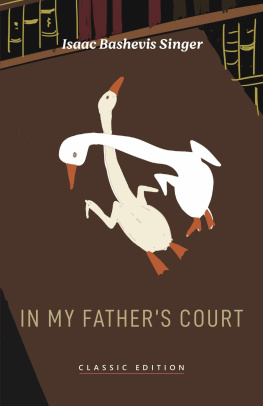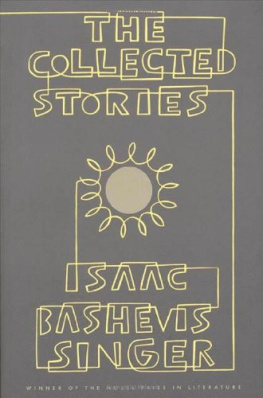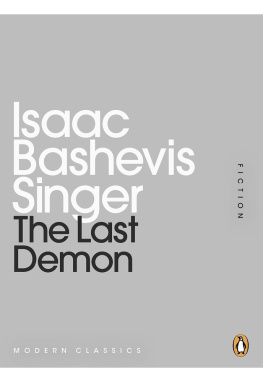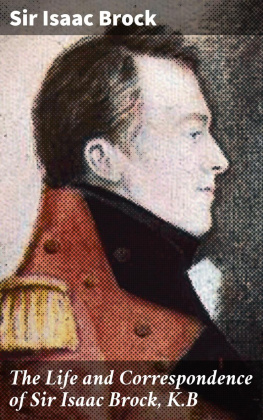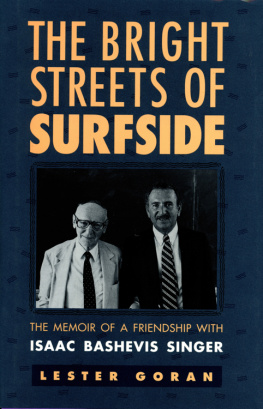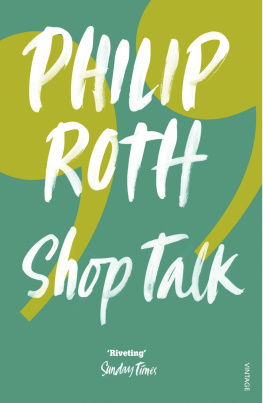Isaac Bashevis Singer - In My Fathers Court
Here you can read online Isaac Bashevis Singer - In My Fathers Court full text of the book (entire story) in english for free. Download pdf and epub, get meaning, cover and reviews about this ebook. year: 1966, publisher: Macmillan, genre: Non-fiction. Description of the work, (preface) as well as reviews are available. Best literature library LitArk.com created for fans of good reading and offers a wide selection of genres:
Romance novel
Science fiction
Adventure
Detective
Science
History
Home and family
Prose
Art
Politics
Computer
Non-fiction
Religion
Business
Children
Humor
Choose a favorite category and find really read worthwhile books. Enjoy immersion in the world of imagination, feel the emotions of the characters or learn something new for yourself, make an fascinating discovery.
- Book:In My Fathers Court
- Author:
- Publisher:Macmillan
- Genre:
- Year:1966
- Rating:3 / 5
- Favourites:Add to favourites
- Your mark:
- 60
- 1
- 2
- 3
- 4
- 5
In My Fathers Court: summary, description and annotation
We offer to read an annotation, description, summary or preface (depends on what the author of the book "In My Fathers Court" wrote himself). If you haven't found the necessary information about the book — write in the comments, we will try to find it.
Isaac Bashevis Singer: author's other books
Who wrote In My Fathers Court? Find out the surname, the name of the author of the book and a list of all author's works by series.
In My Fathers Court — read online for free the complete book (whole text) full work
Below is the text of the book, divided by pages. System saving the place of the last page read, allows you to conveniently read the book "In My Fathers Court" online for free, without having to search again every time where you left off. Put a bookmark, and you can go to the page where you finished reading at any time.
Font size:
Interval:
Bookmark:
IN MY FATHERS
COURT
ISAAC BASHEVIS SINGER

In My Fathers Court, Copyright 2021 by The Isaac Bashevis Singer Literary Trust
All rights reserved. No part of this publication may be reproduced in whole or in part, or stored in a retrieval system, or transmitted in any form or by any means, electronic, mechanical, photocopying, recording, or otherwise, without written permission of the publisher. For information regarding permission, write to: Goodreads Press, 454 West 44th Street, New York, NY 10036, or email .
TABLE OF CONTENTS
AUTHORS NOTE
In My Fathers Court, or Beth Din, as this book is called in the Yiddish original, is in a certain sense a literary experiment. It is an attempt to combine two stylesthat of memoirs and that of belles-lettresand its approach to description and its manner of conveying situations differ from those used in my other writings. The pieces here were first published as a series under my journalistic pseudonym, Isaac Warshawsky, in the Jewish Daily Forward. The idea had been with me a long time: when still very young, I had actually thought of writing my recollections of the Beth Din. It was only after the newspaper publication of the series that I decided to release them in book form under my own name, because they portrayed a life and environment that no longer exist and are unique.
This book tells the story of a family and of a rabbinical court that were so close together it was hard to tell where one ended and the other began. The rabbinical court, the Beth Din, is an ancient institution among the Jews. It started when Jethro counseled Moses to provide out of all the people able men, such as fear God, men of truth, hating covetousness and let them judge the people at all seasons. There is a direct line between the Beth Din of today and the Talmudic annotators, Geonim, Princes, Amoraim, Tannaim, Men of the Great Synagogue, and Sanhedrin. The Beth Din was a kind of blend of a court of law, synagogue, house of study, and, if you will, psychoanalysts office where people of troubled spirit could come to unburden themselves. That such a mixture was not only feasible but necessary was proved by the continued existence of the Beth Din over many generations.
It is my firmest conviction that the court of the future will be based on the Beth Din, provided the world goes morally forward instead of backward. Though the Beth Din is rapidly disappearing, I believe it will be reinstated and evolve into a universal institution. The concept behind it is that there can be no justice without godliness, and that the best judgment is one accepted by all the litigants with good will and trust in divine power. The opposite of the Beth Din are all institutions that employ force, whether of the right or the left.
The Beth Din could exist only among a people with a deep faith and humility, and it reached its apex among the Jews when they were completely bereft of wordly power and influence. The weapon of the judge was the handkerchief the litigants touched to signify their acceptance of the judgment. I have not attempted to idealize the Beth Din or to endow it with conditions and moods that were not a part of my direct experience. The Beth Din not only differed in every generation, but every Rabbi who participated in it colored it with his character and personality. Only that which is individual can be just and true.
At times I think that the Beth Din is an infinitesimal example of the celestial council of justice, Gods judgment, which the Jews regard as absolute mercy.
The pieces in this book were translated by Channah Kleinerman-Goldstein, Elaine Gottlieb, and my nephew Joseph Singer. I am grateful for the editorial help of Robert Giroux and Henry Robbins. I am also grateful to the editors of the following magazines, in which parts of the book previously appeared: American Judaism, Commentary, The Critic, Harpers Magazine, Jewish Heritage, and The Saturday Evening Post.
I.B.S.
THE SACRIFICE
There are in this world some very strange individuals whose thoughts are even stranger than they are.
In our house in WarsawNo. 10 Krochmalna Streetand sharing our hallway, there lived an elderly couple. They were simple people. He was an artisan, or perhaps a peddler, and their children were all married. Yet the neighbors said that, despite their advanced years, these two were still in love. Every Sabbath afternoon, after the cholent, they would go for a walk arm in arm. In the grocery, at the butcherswherever she shoppedshe spoke only of him: He likes beans he likes a good piece of beef he likes veal There are women like that who never stop talking about their husbands. He, in turn, also would say at every opportunity, My wife.
My mother, daughter of generations of Rabbis, frowned upon the couple. To her such behavior was a sign of commonness. But, after all, loveespecially between an elderly couplecannot be dismissed so easily.
Suddenly there was a rumor that shocked everyone: the old people were going to be divorced!
Krochmalna Street was in an uproar. What did this mean? How could it be? Young women wrung their hands: Mamma, Im going to be ill! I feel faint! Older women proclaimed: It is the end of the world. The angry ones cursed all men: Well now, arent men worse than beasts? Soon the street was aroused by an even more outrageous report: they were getting the divorce so that the old sinner could marry a young girl. You may well imagine the curses that were heaped upon the old mana burning in his belly, a pain in his black heart, a fire in his bowels, a broken arm and leg, a plague, the judgment of heaven upon him! The womenfolk spared no curse and prophesied that he would not live to see his wedding day, the old billy goatinstead of a wedding canopy he would find a black coffin.
In our home, in the meantime, the truth, the real truth, came to light.
The old woman herself came to my mother and spoke to her in such a manner that my mothers pale face flushed with embarrassment. Although she tried to chase me away so that I would not be able to hear, I did listen, for I was afire with curiosity. The woman swore to my mother that she loved her husband more than anything in the world.
Dear lady, she argued, I would gladly give my life to save a fingernail of his. I am, woe is me, an old womana broken shardbut he, he is still a man. He needs a wife. Why should he be burdened with me? As long as the children were still at home, one had to be careful. People would gossip. But now what they say matters no more to me than the cats meow. I no longer need a husband, but hemay he be wellis like a young man. He can still have children. And now he has found a girl who wants him. She is past thirty; the time has come for her, too, to hear the wedding music play. Besides, she is an orphan and works for others as a maid; she will be good to him. With her he will enjoy life. As for me, I am provided for. He will give me enough to live on, and I do a little peddling on the side. What do I need at my age? I only want to see him happy. And he promised me thatafter a hundred and twenty years, when the time comesI will lie next to him in the cemetery. In the other world I will again be his wife. I will be his footstool in Paradise. It has all been settled.
The woman had come, quite simply, to ask my father to arrange the divorce and then perform the wedding.
My mother tried to dissuade her. Like the other women, my mother saw in this affair an affront to all womankind. If all old men were to start divorcing their wives and marrying young girls, the world would be in a fine state. Mother said that the whole idea was clearly the work of the Evil One, and that such love is an impure thing. She even quoted one of the books on ethics. But this simple woman, too, could cite Scripture. She reminded my mother of how Rachel and Leah had given their maidservants, Bilhah and Zilpah, to Jacob as concubines.
Next pageFont size:
Interval:
Bookmark:
Similar books «In My Fathers Court»
Look at similar books to In My Fathers Court. We have selected literature similar in name and meaning in the hope of providing readers with more options to find new, interesting, not yet read works.
Discussion, reviews of the book In My Fathers Court and just readers' own opinions. Leave your comments, write what you think about the work, its meaning or the main characters. Specify what exactly you liked and what you didn't like, and why you think so.

